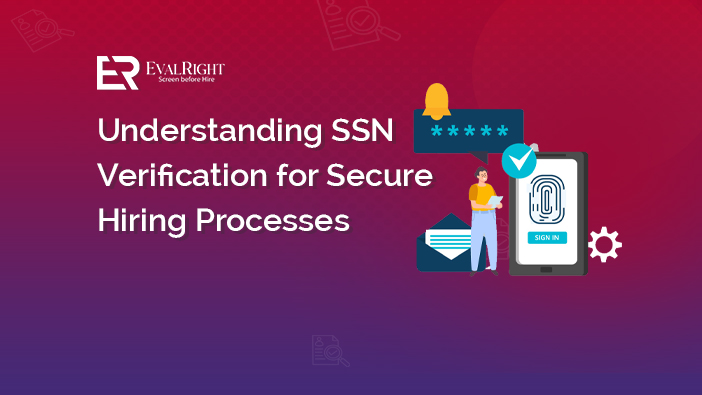Understanding SSN Verification for Secure Hiring Processes
In today’s fast-paced hiring environment, ensuring the accuracy and legitimacy of candidate information is critical for maintaining workplace integrity. One of the most vital steps in this process is Social Security Number (SSN) verification. Employers who prioritize SSN verification significantly reduce the risk of identity fraud, hiring ineligible workers, and ensuring compliance with regulations. This blog post will explore the importance of SSN verification and how it contributes to a secure and compliant hiring process.
What Is SSN Verification?
SSN verification is the process of confirming that a candidate’s Social Security Number is valid and matches their identity. This is done by cross-checking the SSN with official records to verify that the number was legally issued to the candidate. SSN verification typically involves checking for discrepancies, such as mismatched names or unissued numbers.
Verifying SSNs is particularly important in preventing fraud, maintaining compliance with employment laws, and safeguarding your organization from hiring undocumented workers.
Why Is SSN Verification Important for Employers?
1. Prevents Identity Theft and Fraud
One of the most significant risks to employers is hiring someone who has provided a false or stolen identity. SSN verification acts as a frontline defense against identity theft by ensuring that the candidate’s name matches their social security records.
2. Ensures Employment Eligibility
SSN verification helps employers ensure that they hire legally authorized individuals to work in the country. Failure to verify this can result in penalties, fines, or legal consequences.
3. Compliance with Federal and State Regulations
Many industries are required by law to verify the SSNs of employees for various compliance reasons, including IRS tax reporting, Form I-9 employment eligibility verification, and background checks. Employers who fail to perform this verification risk violating federal and state regulations.
4. Reduces Risk of Payroll Issues
SSN verification helps prevent errors in payroll processing, such as incorrect reporting of wages to the IRS. It also minimizes the chances of misreporting an employee’s income, which could cause problems during tax season.
How Is SSN Verification Done?
SSN verification can be conducted in several ways:
1. The Social Security Administration (SSA) Verification Service
Employers can use the Social Security Number Verification Service (SSNVS) provided by the Social Security Administration (SSA). This service allows employers to verify the names and SSNs of employees against SSA records.
2. Form I-9 Employment Eligibility Verification
As part of the hiring process, employers are required to complete Form I-9, which includes verifying the employee’s eligibility to work. The employer must review identity documents, and SSN verification is a critical part of this process.
3. Third-Party Background Check Providers
Many employers use third-party verification services that offer comprehensive background checks, including SSN verification. These services streamline the hiring process by providing quick and accurate results.
Key Benefits of SSN Verification
1. Improved Security
SSN verification improves the overall security of your hiring process by ensuring that candidates are who they claim to be.
2. Enhanced Trust with Clients and Employees
Employers can build trust with clients and the workforce by ensuring that only legitimate workers are hired, contributing to a more ethical and responsible work environment.
3. Reduced Legal Risks
Ensuring compliance with employment and tax laws helps employers avoid legal issues, fines, and other penalties.
Best Practices for Implementing SSN Verification
- Start Early: Make SSN verification part of the pre-employment process.
- Use Reliable Services: Ensure that the verification service you choose is reputable and complies with legal standards.
- Maintain Confidentiality: Handle SSN information with care and ensure that it is protected from unauthorized access.
- Stay Updated: Employment laws and regulations can change. Stay informed about any updates that might impact SSN verification requirements.
Conclusion
SSN verification is a crucial element of a secure and compliant hiring process. It protects against identity theft, ensures employment eligibility, and helps employers remain compliant with federal and state regulations. By prioritizing SSN verification, employers can create a safer and more secure workplace.
5 Engaging FAQs
1. How does SSN verification prevent identity theft?
SSN verification cross-checks the candidate’s information with official records, helping to ensure that the individual is using their true identity, thus preventing identity theft.
2. Is SSN verification mandatory for all employers?
While not always mandatory, many employers are required to verify SSNs to comply with federal and state regulations, especially in industries with strict compliance requirements.
3. How long does SSN verification take?
SSN verification through the Social Security Administration or third-party services is typically quick, often taking just a few minutes to a few days depending on the method used.
4. Can SSN verification help with payroll accuracy?
Yes, verifying SSNs ensures that employee records match IRS records, reducing the likelihood of payroll errors or misreported income.
5. What should I do if there is a discrepancy in SSN verification?
If there is a discrepancy, employers should notify the candidate and allow them to correct any errors. If the issue persists, employers may need to take further steps to confirm the candidate’s eligibility.

